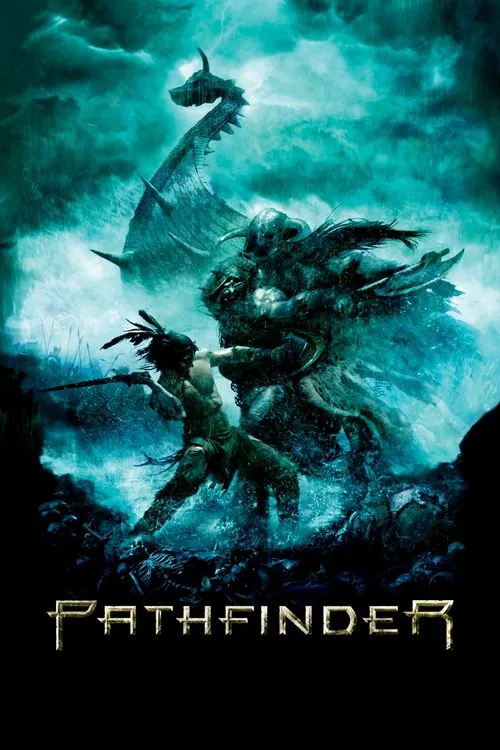Pathfinder

Plot
Pathfinder, directed by Marcus Nispel, is an action-adventure film that delves into the complexities of cultural clashes and the resilience of the human spirit. The story takes place in the midst of a medieval Viking invasion of the Americas, where a young boy from the Norse tribe finds himself alone and adrift after the skirmish between his people and a Native American tribe. The boy, a 12-year-old Viking named Ghost (played by Karl Urban), witnesses the carnage and bloodshed as the tribes clash. Left behind in the chaos, Ghost must fend for himself in the heart of the Algonquin forest. His only hope for survival lies with the tribe he had been fighting against mere hours before. Ghost stumbles upon the tribe's hunting party, but instead of attacking him, they take pity on the young boy. Taken in by the tribe's leader, Chief Black Hawk (played by Russell Means), Ghost is given the name 'Pathfinder.' Though a Viking by birth, the young boy is raised by the Algonquin tribe, taught their ways, and learns their language. Pathfinder's unique upbringing allows him to form a bond with the tribe, particularly with a local boy named Black Dog (played by Jake Mosher). As he grows, Pathfinder learns the importance of honor, loyalty, and family within the tribe. However, the weight of his Viking heritage constantly lingers, making him an outsider within the tribe he now calls home. The tribe's tranquil existence is disrupted by the arrival of a Norse war party, led by the ruthless and cunning Leif Erikson (played by Omar Metwally). The Norsemen are ruthless, hell-bent on destroying the tribe, and exploiting their land for gold and riches. The situation escalates when the tribe discovers Erikson's plan to establish a fortified settlement and begin a campaign of terror against the native inhabitants. Chief Black Hawk seeks guidance from the spirits and visions that haunt him, but the tribe's fate remains uncertain. As the Norse forces draw near, Pathfinder finds himself at a crossroads. His Viking blood and knowledge of the Norse army's tactics give him the leverage to become a pivotal part of the tribe's defense. With a mix of courage, strategic thinking, and his intimate knowledge of the Norse army, Pathfinder becomes a crucial element in the tribe's fight for survival. He leads a small band of brave warriors, including Black Dog, in a daring raid against the Norse war party. The fate of their tribe, and the delicate balance between their cultures, hang precariously in the balance. Throughout the battle-filled climax, Pathfinder must confront the harsh reality of his mixed identity. His Viking loyalty clashes with his Algonquin brotherhood, and he is forced to re-examine his allegiances. Despite this turmoil, he finds the strength to face his enemies head-on and fight for the people who raised him with love and acceptance. In the heat of the battle, Pathfinder faces off against his long-lost father, Thorold (played by Jason Patric). A Viking warrior with unyielding hatred for the Algonquin tribe, Thorold's presence ignites a deep-seated conflict within his son. Faced with a choice between his Viking heritage and his Algonquin family, Pathfinder makes a choice that seals his destiny. In the aftermath of the battle, the Norse war party lies defeated, their plans foiled by the bravery and ingenuity of the Algonquin tribe, with Pathfinder at their side. The Algonquin emerge victorious, having protected their land and their way of life. Though scarred by the violence and bloodshed, the tribe is strengthened by Pathfinder's determination and loyalty. A new era begins for the Algonquin, with Pathfinder standing proudly among them, his mixed identity a symbol of hope and resilience. Pathfinder is a powerful and thrilling story of identity, redemption, and the unbreakable bonds between people across cultures.
Reviews
Adrian
🎫 2024.11.16, Norwegian Film Festival A legacy that deserves to be carried on.
Kaia
Nominated for Best Foreign Language Film at the 1988 Oscars. The first feature film in the Sami language by a Sami director in film history. It might be a bit difficult to categorize within a specific cinematic movement, but the "ethnic epic" genre is quite appealing. The film's greatest strength is undoubtedly its cinematography. The use of backlight is absolutely stunning. In terms of screenplay, it largely focuses on ensemble character development, with extensive use of dual-timeline cross-cutting. I'm particularly curious about what these militants eat and drink, as they don't seem to require meals or logistics in the movie (a somewhat peculiar focus, I admit...).
Recommendations




